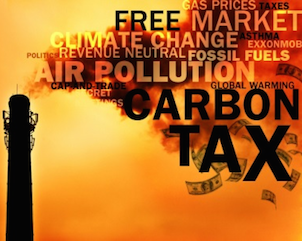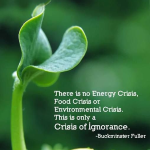
Discussion U.S. Carbon Price 2014
 Jim Stack Mar 10, 2014 03:17 |
Just add a carbon tax like Canada did and raise it each year. They are now at $30 a ton.
http://www.carbontax.org/progress/where-carbon-is-taxed/
Where Carbon is Taxed
This page reports on carbon taxes that have been enacted or proposed around the world.
British Columbia
We start this page with British Columbia (“BC”) because its carbon tax qualifies as the most significant carbon tax in the Western Hemisphere by far. It is also extremely straightforward and transparent in both administration and revenue treatment.
The tax was inaugurated on July 1, 2008 at a rate of $10 (Canadian) per metric ton of carbon dioxide, and rose by $5/tonne annually to reach $30 per tonne of CO2 in July 2012. (The Canadian and American dollar are roughly at parity; all dollar figures in this section are Canadian; a metric ton, or tonne, equals roughly 1.1 American or “short” tons, making a “per-tonne” charge roughly 10% less impactful than the same per-ton charge.) The carbon tax revenues are being returned to taxpayers through personal income and business income tax cuts, as promised by Carole Taylor, who as BC finance minister spearheaded the push for the tax in the first half of 2008.
|
 Monad Kiysuren May 9, 2014 04:03 |
"Just add a carbon tax like Canada did and raise it each year."
Are you kidding me? America is one step (if Republicans control the Senate in 2014) away from going toward opposite direction. I mean they want to get rid of existing regulations and dismantle EPA. Majority of Republicans think that climate change is a hoax. And the bipartisan democrats (with a few exceptions) don't want to deal with environmental problems.
So how are you going to "just add" carbon tax?
|
 Ross Collins Jun 18, 2014 10:37 |
FYI to current and prospective proposal writers:
National Laboratory Researchers Publish Renewable Portfolio Standards Report
Renewable portfolio standard (RPS) policies are in place in more than half of all U.S. states and have played a critical role in driving renewable energy deployment over the past decade. In many states, however, fierce debates have recently arisen regarding the cost of RPS policies, and proposals have been introduced to repeal, reduce, or freeze existing requirements. A Survey of State-Level Cost and Benefit Estimates of Renewable Portfolio Standards (http://emp.lbl.gov/publications/survey-state-level-cost-and-benefit-estimates-renewable-portfolio-standards) seeks to inform these debates by summarizing available data on the costs and benefits of RPS policies to-date and by highlighting key methodological issues that must be considered. Authors from Lawrence Berkeley National Laboratory (LBNL) and the National Renewable Energy Laboratory (NREL) contributed to the report.
|
 Ross Collins Jun 18, 2014 10:22 |
An upcoming morning seminar potentially of interest to any of our CoLab community based in DC:
A Discussion of the Independent Risk Assessment for Risky Business: The Economic Risks of Climate Change in the United States (http://www.rff.org/Events/Pages/A-Discussion-of-the-Independent-Risk-Assessment-for-Risky-Business-The-Economic-Risks-of-Climate-Change-in-the-United-State.aspx)
RFF Seminar
Date
June 26, 2014
9:00 - 10:30 a.m. EDT
Location
RFF First Floor Conference Center
1616 P St. NW
Washington, DC 20036
Registration for in-person attendance is required. To RSVP for this event, please visit RFF's event registration page.
How much economic risk does the nation face from the impacts of climate change? The Risky Business initiative—a project of Bloomberg Philanthropies, the Office of Hank Paulson, and Next Generation—works to answer that question. Using the best information available, the initiative outlines the range of climate futures that the United States might expect in major economic sectors and by geographic region. It also examines the likelihood of these futures and the potential economic consequences for American businesses and households. The initiative does not advocate any particular policy, industry, or personal response to climate change but instead seeks to provide government, finance, business, and household decisionmakers with the information necessary to make their own risk management decisions.
At this RFF seminar, Trevor Houser, lead author of the independent risk assessment supporting the Risky Business initiative, and his colleagues will present an overview of the methods, data, original research, and key findings in the assessment. A panel of experts will then offer additional perspectives.
Agenda
8:30 a.m.
Light breakfast available
9:00 a.m.
Welcome
Phil Sharp, President, Resources for the Future
9:10 a.m.
Overview of Risky Business
Trevor Houser, Partner, The Rhodium Group and Technical Lead, Independent Risk Assessment for Risky Business
Robert Kopp, Assistant Professor, Department of Earth and Planetary Sciences; and Associate Director, Rutgers Energy Institute, Rutgers University
Solomon Hsiang, Assistant Professor of Public Policy, University of California, Berkeley
9:40 a.m.
Panel Discussion: A Technical Review
James Stock, Member, Council of Economic Advisers; and Harold Hitchings Burbank Professor of Political Economy, Harvard University
Adele Morris, Fellow and Policy Director, Climate and Energy Economics, The Brookings Institution
10:15 a.m.
Q&A
10:30 a.m.
Adjourn
|
 Ross Collins Jun 26, 2014 11:29 |
A new study by Harvard researchers shows that voting (i.e. democracy) is key to solving complex problems like climate change. Interesting and very relevant to the Climate CoLab community - check it out! Link and story below.
http://www.sciencedaily.com/releases/2014/06/140625132354.htm
A vote for cooperation
Research suggests voting may be key to cooperation with future generations
------------------------------------------------------------------------------------------"In some sense, this illustrates why the free market fails to solve problems like climate change," Nowak added. "Even if you want to cooperate with the future, you may not do so because you are afraid of being exploited by the present."
--------------------------------------------------------------
Whatever the solutions to preserving our world's natural resources might be, it seems clear that answers won't come overnight. How, then, can we be sure the steps we take today won't jeopardize the fate of future generations?
The answer, researchers say, may lie with one of cornerstones of modern society - democracy.
Using a series of modified public goods "games," Professor of Mathematics and of Biology, and Director of the Program for Evolutionary Dynamics Martin Nowak, Assistant Professor of Psychology and Economics at Yale David Rand, and their colleagues demonstrated that allowing people to vote on the harvesting of resources led to the preservation of these resources for future generations. The study is described in a June 26 paper published in Nature.
"There has been a great deal of work on how people cooperate with those they see every day - their colleagues or friends," Nowak said. "But an open question is how people cooperate with future generations. How do you make altruistic decisions today that benefit people tomorrow?"
To study cooperation across generations, Nowak and Rand worked with doctoral student Oliver Hauser and post-doctoral researcher Alexander Peysakhovich to develop a unique version of the commonly-used public good game in which five online players were tasked with dividing 100 units of a resource between them.
Each player was allowed to collect up to 20 units of the resource. As long as all players together harvested up to half of the 100 units, the resource was replenished for subsequent generations - other players who would be recruited later. If players harvested more than half, however, the resource was exhausted, and subsequent players earned nothing while being told that earlier generations hadn't acted sustainably.
Though clearly designed to encourage players to preserve resources for subsequent generations, when Nowak and Rand began recruiting players, they found a curious result - in nearly every game, players quickly exhausted the resource.
"Typically, the way it played out was four players acted generously, while one person chose maximum defection," Nowak said.
Though the test revealed many people might be willing to pay some costs to benefit future generations, it also highlighted a problem with what researchers call "conditional cooperation," which suggests people are only willing to cooperate if they believe others are doing the same. Often, Rand and Nowak said, players who chose to maximize their own benefit did so because they feared other players were taking a larger share of the resource.
"In some sense, this illustrates why the free market fails to solve problems like climate change," Nowak added. "Even if you want to cooperate with the future, you may not do so because you are afraid of being exploited by the present."
To ward off that problem, Nowak and Rand re-wrote the rules of the game to allow each player to vote on how much of the resource to extract, and giving each player the median of all five votes.
"Democracy is a powerful institution," Nowak explained. "When we implemented this system, virtually every resource was saved. The surprising observation is that while there is a minority of people who don't want to cooperate, the majority of people vote altruistically. They are not voting to maximize their own benefit, and that's what allows for cooperation with the future."
Importantly, Nowak and Rand said, for the voting system to work, the winning extraction amount had to be the median of all the votes cast.
"Another way to implement a voting system would be to extract the average of all the votes, but the problem with that system is it forces people to vote strategically," Rand explained. "You may be willing to harvest the resource sustainably, but if you think someone else is going all in, you have to vote for zero to balance out the average. If instead you use the median of the votes, then players can just vote for what they really want."
The finding that people are willing to vote altruistically, Rand said, runs counter to the oft-cited notion that people will ultimately act in their own interests when they go to the ballot box.
"A huge amount of public policy is built around the assumption that everyone is selfish," Rand explained. "The question for policy-makers has always been how to set up an institution that encourages people to do good things even though they're selfish.
"The key take-home message of our paper is that policy makers can take advantage of the fact that many people are not actually selfish," he continued. "A lot of people are altruistic, and you can have more efficient and more effective policies if you take this into account."
Though it's impossible to predict what the future holds, Nowak believes that understanding how to cooperate across generations may open the door to ensuring the decisions we make today do more than simply leave the most challenging problems of the present for future generations to solve.
"There is a huge literature on the evolution of cooperation, but this is the first step toward asking what we can do to cooperate with future generations," he said. "The largest problems we face today are occurring on a global scale - how can we behave altruistically such that something is left for future generations?"
|
 Chris Taylor Jun 28, 2014 06:24 |
Ultimately, nearly all humans want the best for humanity and the future of our planet. So why the polarisation of opinion around climate change? I think, what Nowak and Rand’s research demonstrates, is that participants in an economy aren’t only afraid of not getting their fair share of resources, which is true, but there is a deeper question of trust. In the case of climate change, do we trust that the opposition want the best for humanity and the future of the planet. Without this trust we think that the opinions of others are all biased to suit personal-agendas and consequently need to be fought, exacerbating the polarisation. That’s paranoia! An example of this can be found in the phrase “dirty oil”. It pays no respect to those who are of the opinion that oil has given civilisation so much. It says “to hell with you and your industry”.
For democracy to work in favour of climate change, the public will have to understand the issue. My guess is that 99% of the world population do not even understand what “a price on carbon” means, yet alone all its intricacies and variants. We can not wait for democracy to act on climate change. It is for those deeply involved in climate and energy to find middle ground. There are only a few of us, and it is now our responsibility to have trust in the humanity of those who oppose us.
|
 Noël Bakhtian Jun 30, 2014 06:25 |
From one of the contest's advisors, George Shultz, last month:
Attached is an interesting press statement about a bill now circulating that conceivably will move the ball along.”
http://thehill.com/policy/energy-environment/206926-dem-bill-would-allow-state-carbon-taxes
|
 Huynh Phu Dat Jul 2, 2014 10:50 |
My Proposal is
https://www.climatecolab.org/web/guest/plans/-/plans/contestId/1300404/planId/1307707
The only 1 thing I fear is technical problem . My proposal has some images , and I really hope no technical problem when Climate CoLab send my proposal to Judge . Only technical problem .
|
 Chris Taylor Jul 3, 2014 07:50 |
I notice that the main question for this proposal has changed. The question was “How could the U.S. Congress put a price on carbon emissions?” and not “How could a national price on carbon be implemented in the United States?”
Those who don’t understand the nuances of the politics behind climate change might think that there is very little difference, but the difference is huge. The question “How could a national price on carbon be implemented in the United States?” is a much wider question. For example, it could raise discussions about the different types of pricing tools which could be implemented. The initial question - How could the U.S. Congress put a price on carbon emissions? - had a much clearer objective because it got to the root of the problem, which is the conservatives opposition to any price or tax on carbon.
There are so many ways of implementing a price on carbon. Many of the proposals put forward so far are brilliant, and if they were implemented would truly make a difference, but only if they are implemented. That means Congress has to enact the proposal. The only way that is going to happen is to put forward a proposal acceptable to the conservatives.
There are some who might argue that the public could be persuaded to demand change, or even organise a levy on carbon themselves. This is nothing short of dangerous wishful thinking. As human beings we are incapable of being concerned about long term dangers. It’s why so many continue to smoke, and why none of us worry about our own death a few decades down the line.
Let me give a very specific example. I can think of no organisation who work harder to get a price put on carbon than Citizens Climate Lobby. Words like dedicated, positive, determined and knowledgeable, still wouldn’t express my gratitude towards all the hard work they do. For six years they have all been consistently slogging away to publicise one of the best and fairest and simplest solutions to climate change, namely “Fee and Dividend”.
However, let’s now measure, with cold hard data, how effective their campaigning has been at bringing about a critical mass of civil society, who will demand a price on carbon.
According to Google Trends ( http://www.google.com/trends/explore#cmpt=q ) :
For every 100 million searches there are for the term “Facebook”, there is just one search for the term “Fee and Dividend”.
For every one million searches there are for the term “dog”, there is just one search for the term “Fee and Dividend”.
For every one million searches there are for the term “facebook”, there is just one search for the term “Citizens Climate Lobby”.
For every 10 thousand searches there are for the term “dog”, there is just one search for the term “Citizens Climate Lobby”.
I’m not criticizing Citizens Climate Lobby. They’re great, and I’m really humbled by the quality of their advocacy. The problem is human beings. For the last three decades there has been a drive to make the public concerned about climate change, but according to Google Trends:
For every 10 thousand searches there are for the term “Facebook”, there is just one search for the term “Climate Change”.
For every 100 searches there are for the term “dog”, there is just one search for the term “Climate Change”.
( Watch: https://www.youtube.com/watch?v=lyqpWEF5cLw )
It’s only natural that we imagine the advocacy in ourselves reflected in others, but the data doesn’t lie, and we mustn’t be in denial of it.
There are many solutions which could make a big difference to climate change, but if the government doesn’t enact them, they won’t mean a thing.
Which is why Climate CoLab should change the question back again to “How could the U.S. Congress put a price on carbon emissions?”
|
 Noël Bakhtian Jul 8, 2014 08:14 |
News Item:
http://climatepolicyinitiative.org/publication/cap-and-trade-in-practice-barriers-and-opportunities-for-industrial-emissions-reductions-in-california/
Last week CPI released a report Cap and Trade in Practice — a report that contributes to the dialogue around the practical implementation of California's Cap and Trade Program by taking an on-the-ground look at how firms make abatement decisions under the program, given the broad array of factors that go into business' financial decision-making.
The report discusses barriers and opportunities for industrial emissions reductions under the Cap and Trade Program, focusing on the cement industry as a case study. Based on financial modeling and stakeholder interviews, they found:
The Cap and Trade Program is making a difference in how firms in the cement industry approach abatement decisions — they are exploring opportunities to reduce emissions and factoring the carbon price into their financial analysis. However, the impact of the carbon price on a decision to abate emissions also depends on a range of other factors. In most cases, the carbon price is not the most important factor in making an emissions reduction decision financially attractive.
Under the Cap and Trade Program, California will meet its emissions reduction target as long as the cap is enforced. But policymakers can reduce the cost of meeting the target by taking further action to lower barriers to low-cost or cost-saving abatement options. AB32 already takes this approach through sector-specific complementary policies, but policymakers can do more.
An op-ed in Sacramento's Capitol Weekly discusses in brief our findings and message for policymakers: http://capitolweekly.net/cap-trade-working-bet/
|
 Ross Collins Jul 9, 2014 04:13 |
Just a reminder to everyone that this Friday (July 11) at 12pm ET there will be a webinar for the U.S. Carbon Price contest; all three advisers - George Shultz, Bob Inglis, Phil Sharp - will be present for a very interesting discussion. Announcement for the webinar is below...
Subject: FRIDAY: US Carbon Price Webinar with former US Secretary of State George Shultz and former Members of Congress Bob Inglis and Phil Sharp
Join us for an informational webinar hosted by the MIT Climate CoLab’s carbon price contest, featuring a conversation with former US Secretary of State George Shultz and former Members of Congress Bob Inglis and Phil Sharp. The webinar will consider "How could a national price on carbon could be implemented in the United States?"
The webinar is free and open to the public, and provides an exciting opportunity for contest participants and others considering submitting a proposal by the July 20th deadline, to ask questions and get feedback from advisors who will also be serving as judges.
Friday July 11, 2014
12:00 PM - 1:00 PM EDT
REGISTER now.
If the link above does not work, please copy and paste this url into your address bar to register:https://attendee.gotowebinar.com/register/5806219999474419201
About the MIT Climate CoLab Carbon Price Contest
This year, one of the CoLab’s flagship contest is on carbon pricing in the US. It asks entrants to come up with novel policies, new mobilizations strategies or combinations of the two that could lead Congress to successfully enact legislation that places a price on carbon emissions. Contest advisors include former Secretary of State George Shultz and former Congressional Representatives Bob Inglis and Phil Sharp.
This is a great chance for students, faculty and members of the public to think creatively and share their ideas on climate change policies. Entrants could win $10,000 and have a chance to present their ideas to senior decision makers.
The contest welcomes proposals from all groups and perspectives across the political spectrum.
For more details, please see the contest website at: https://www.climatecolab.org/web/guest/plans/-/plans/contestId/1300404
|
 Jessica Langerman Jul 10, 2014 02:35 |
A brilliant, elegant, and simple (not easy - but simple) solution to the problem of climate change. For doubters, please see how well this is already working in British Columbia: http://www.theglobeandmail.com/globe-debate/the-insidious-truth-about-bcs-carbon-tax-it-works/article19512237/.
Economists across the country, both left and right, agree that this free-market approach, in which the social costs of fossil fuels are at last internalized, could have a dramatic impact in reducing GHG in our atmosphere. We don't need to wait for a technological solution or the infrastructure to roll it out; using our economy, we can shape behavior. Driving up the cost of fossil fuels while driving down other taxes so that people's overall tax burden/cost of living remains unchanged or simply rebating the revenue is an obvious win-win.
|
 Wayne Van Dyck Jul 10, 2014 04:09 |
As an economist, businessman and entrepreneur, there is no question that a revenue neutral carbon tax is the most effective tool to accelerate the clean energy revolution. A carbon tax would change the economic relationships between carbon energy sources and clean energy driving a lot more capital into clean energy technologies. We need this BADLY.
|
 Noël Bakhtian Jul 24, 2014 07:21 |
From ClimateWire:
Californians show strong support for laws on climate, but higher energy prices could weaken it
Anne C. Mulkern, E&E reporter
Published: Thursday, July 24, 2014
Californians overwhelmingly favor state laws aimed at limiting climate change. But that support would drop notably if the rules start to hurt wallets, an opinion poll released today said.
The Public Policy Institute of California (PPIC) found that 76 percent of Golden State voters back the 2011 law requiring that one-third of California's electricity come from renewable resources by 2020. The share of those endorsing it would tumble to 46 percent if electricity bills climb as a result, however.
Similarly, 76 percent of adults surveyed endorsed a state law that next year will force oil companies to join the state's cap-and-trade program for carbon emissions. Fuel refiners will have to either make gas and diesel with lower emissions or buy permits covering that pollution. Petroleum companies and their backers insist it will force drivers to pay more at the pump and have launched a campaign alerting residents to the pending change.
The PPIC poll showed that support for fuels as part of cap and trade would fall to 39 percent if it costs motorists more to fill up their vehicles.
"Californians want to see government action to reduce greenhouse gas emissions, but their strong support for clean energy policies diminishes if they have to pay higher electricity bills or gas prices," said Mark Baldassare, PPIC's president and CEO.
PPIC annually conducts a statewide survey of Californians attitudes on environmental issues. In the latest inquiry, it talked to 1,705 adult residents July 8-15. The poll has a 3.7-percentage-point margin of error.
The poll asked questions about climate change, drought, water use in general, hydraulic fracturing, the Keystone XL pipeline and a number of other issues.
The results have come shortly after the state Water Resources Control Board allowed $500-per-day fines for wasting water. The poll also shows how voters are feeling about the state's cap-and-trade system in the same year that the Legislature and Gov. Jerry Brown (D) approved a spending plan for revenues generated by the program.
Cap and trade an unknown to many
California voters expressed support for the state's approach on climate, with 65 percent saying that the state is right to act on its own without waiting for the federal government.
About two-thirds of Californians supported the state's climate law, A.B. 32, which requires California to reduce its greenhouse gas emissions to 1990 levels by 2020.
Strong majorities have backed the law since the survey first asked about it in July 2006, PPIC said, "but a partisan divide has emerged on the question."
Most Democrats, Republicans and independents favored the law in 2006, PPIC said. Since then, support for it has risen to 81 percent from 67 percent among Democrats, while it's dropped to 39 percent from 68 percent among Republicans. Among independents, it's dipped slightly, to 62 percent from 68 percent.
The poll showed, however, that a large segment of voters aren't very knowledgeable about specific policies under the climate law.
Asked about the state's cap-and-trade program, 55 percent of people said that they had heard "nothing at all" about the system, which limits carbon emissions and requires businesses to cut their pollution or buy permits for it. Another 32 percent said they had heard a little, and 13 percent answered that they had heard a lot about the policy.
People then were read a description of the program. Afterward, 51 percent of all adults said they favored it, and 40 percent opposed it. However, among likely voters, half opposed it and 43 percent favored it.
They were asked about the plan for spending state revenues generated by cap-and-trade auctions. Brown's office and top state lawmakers in June reached agreement on a package that carved up $870 million that the state expects to see in fiscal 2014-15 from its sales of greenhouse gas pollution permits to businesses. The pact also set up a plan for fiscal 2015-16 and beyond, when the program is estimated to bring in up to $5 billion annually (ClimateWire, June 13).
For the coming fiscal year, the pact dedicated $250 million to high-speed rail, $200 million to low-carbon transportation, $130 million to "affordable housing and sustainable communities" and smaller amounts to items that include weatherization projects, energy efficiency for water, sustainable forests and waste diversion.
In the poll, 59 percent of California adults favored that plan and 35 percent opposed it. Among likely voters, support was 51 percent and disagreement 44 percent.
'Framing' of questions disliked
Green groups criticized how the questions were asked about the renewable power mandate and the cap-and-trade program.
"It's a terribly framed question. It's the oil industry frame" that gas prices will go up when fuels are added to cap and trade, said Susan Frank, director of the California Business Alliance for a Green Economy.
The oil industry and its allies are the ones promoting the idea that bringing fuels into cap and trade will trigger higher fuel prices, she said.
"Most people, when asked that question, are going to say of course they don't want to pay more," she said, adding, "At the end of the day, you'd be better off consulting the Magic 8 Ball what [fuel] prices are going to be in January."
The questions also fail to talk about the benefits of cap and trade and the renewable power mandate, said Frank and Tim O'Connor, an attorney with the Environmental Defense Fund.
"If you ask the average person if they want to spend more money, they're likely going to say no," O'Connor said, "but if you ask that person, would they like to keep their kid from having an asthma attack and going to the hospital," the person would say yes.
A spokesman for Fed Up at the Pump, the oil industry-supported group fighting bringing fuels into cap and trade, declined to comment, saying that the alliance needed to first read through the PPIC survey questions and results.
That website tells people, "Starting Jan. 1, 2015, Californians will pay an additional 16 cents or more per gallon of gas as a result of a state agency-mandated gas fee -- a 'hidden tax' -- that was created by the Brown Administration without consumer input or legislative review.
"Help us put a halt to this gas hike before it starts. Let's tell Governor Brown to 'BACK OFF!'"
A.B. 32 was passed by the state's Legislature. It allowed the state's Air Resources Board to decide on the policies for lowering the state's carbon emissions. That agency opted for cap and trade after a lengthy public discussion on options.
Carbon tax garners support
The poll asked about a carbon tax. Fifty-eight percent of Californians backed imposing "a carbon tax on companies for their greenhouse gas emissions," while 33 percent opposed it. Support was 71 percent among Democrats, 59 percent among independents and 34 percent among Republicans. It did not ask voters to compare a carbon tax with any other climate policy.
Frank challenged the wording of that question, saying a carbon tax would likely be on fuels, not on businesses.
"My guess is that the level of support would change dramatically if people knew that they were the ones paying for it," Frank said.
O'Connor said that there are many ways to do a carbon tax. What was talked about earlier this year, he noted, was a levy on fuels. Sen. Darrell Steinberg (D), who at the time was the chamber's leader, proposed levying a carbon tax on motor fuels and in exchange exempting them from cap and trade. He ultimately dropped the measure.
The poll delved into state voters' beliefs on climate change. Forty percent said that they were very concerned about global warming, 34 percent said they were "somewhat concerned" and 15 percent said they were "not concerned at all."
California voters largely feel that climate change already is underway, with 62 percent agreeing that "the effects of global warming have begun to happen." Twelve percent on the timing said that warming would affect future generations. Another 12 percent said it would never happen.
The poll asked voters for their views on the impacts from climate change. In terms of the potential for more severe droughts, 64 percent said they were very concerned and 23 percent said they were somewhat concerned. More severe wildfires had 61 percent very concerned and 25 percent somewhat concerned.
Asked about more severe heat waves, 44 percent were very concerned and 29 were somewhat concerned, while 15 percent were "not too concerned" and 12 percent were "not concerned at all."
Asked what's behind the current drought in California, 38 percent said that it was mostly a result of global warming, while 51 percent said it was mostly an effect of natural weather patterns.
The poll asked about hydraulic fracturing. Half of likely voters were opposed to the increased use of "fracking" for oil and natural gas extraction, while 40 percent favored it.
But asked about the Keystone XL pipeline, which would transport oil from Canada to refineries in Texas, 58 percent of likely voters said that they favored building it. Thirty-four percent opposed it.
|
 Noël Bakhtian Jul 24, 2014 07:45 |
PAPER: Public Views on a Carbon Tax Depend on the Proposed Use of Revenue: http://closup.umich.edu/files/ieep-nsee-2014-spring-carbon-tax.pdf
|
 Michael Hayes Jul 30, 2014 06:08 |
Noel et. al.,
Thanks for the UMICH link. On the issue of 'how to use the tax': In general, as the global warming issue is...well...global, it is important to view any proposal in terms of: How can the proposal be propagated globally?
Pricing carbon is a profoundly complex issue and becomes even more so when the issue of carbon negative bio-fuels are factored into the math/projections. In that, it is in the environmental best interest of a nation (and the international community of nations) to produce/use as much carbon negative bio-fuels as possible as that scenario is a fast/equitable path to climate stability. The expected broad economic stimulus that such increased fuel use would generate would clearly be a highly convenient byproduct. (This is the opposite of the FF paradigm.)
Thus, using the carbon tax funds to fast-track carbon negative fuel development/production expansion (the IMBECS Protocol provides one path) would be a form of a force multiplier for the carbon tax. There is no apparent (to me) reason why all nations could not follow the US lead on this type of strategy and thus the carbon negative fuel STEM/strategy can be easily and relatively quickly scaled to global dimensions.
I hope this has not come across as completely incoherent:)
Best regards,
Michael
|
 Dennis Peterson Aug 5, 2014 07:53 |
Comment #5 is pretty interesting. It sounds like we'd do well to set a carbon price or cap by letting people vote on what they want it to be, and taking the median.
|
 Noël Bakhtian Aug 27, 2014 10:42 |
FYI:
new MIT Study: Cutting Greenhouse Gas Emissions Could Pay for Itself
http://newsoffice.mit.edu/2014/cutting-carbon-health-care-savings-0824
Summary from DOE EERE weekly newsletter:
A new study from the Massachusetts Institute of Technology (MIT) found that when addressing climate change, the savings on health care spending and other costs related to illness can potentially offset the costs of cutting harmful emissions from sources such as power plants and vehicles.
In the study published in Nature Climate Change, MIT researchers compared the health benefits to the economic costs of three potential climate policies: a clean-energy standard, a transportation policy, and a cap-and-trade program. The three scenarios were designed to resemble previously proposed U.S. climate policies at the federal level.
The researchers found that savings from avoided health problems could recoup 26% of the cost to implement a potential transportation policy, but up to 10.5 times the cost of implementing a cap-and-trade program. The difference depended largely on the costs of the policies, as the savings—in the form of avoided medical care and saved sick days—remained roughly constant. Policies aimed at specific sources of air pollution, such as power plants and vehicles, did not lead to substantially larger benefits than cheaper policies across three scenarios.
|
 Noël Bakhtian Sep 19, 2014 09:55 |
In the news: Global investors urge leaders to act on carbon pricing ahead of UN meeting
(Reuters) - More than 340 institutional investors representing $24 trillion in assets on Thursday called on government leaders attending next week's United Nations climate summit to set carbon pricing policies that encourage the private sector to invest in cleaner technologies.
Firms signing a joint letter include BlackRock, Calvert Investments, BNP Paribas Investment Partners and Standard Bank.
They want countries to set a price tag on pollution by taxing carbon emission or implementing cap and trade emissions policies to create incentives for investing in cleaner technologies.
"Stronger political leadership and more ambitious policies are needed in order for us to scale up our investments," the investors' statement said.
The UN climate change summit on Sep. 23, devised and led by Secretary General Ban-ki Moon, will bring heads of state and senior officials from more than 125 countries, including U.S. President Barack Obama, to New York to mobilize global action to address climate change.
The institutional investors added that gaps and delays in implementing climate change policies increase risks to their investments since the physical impacts of climate change "will increase the likelihood that more radical policy measures will be required to reduce greenhouse gas emissions."
In addition to political declarations, the UN summit will place a heavy focus on the role the business and financial communities can play to drive low-carbon economic growth.
"Investors are owners of large segments of the global economy as well as custodians of citizens' savings around the world. Having such a critical mass of them demand a transition to the low-carbon and green economy is exactly the signal governments need in order to move to ambitious action quickly," said Achim Steiner, director of the UN Environment Programme.
UNEP coordinated the joint investor statement with four investor groups focused on climate change, including Ceres' Investor Network on Climate Risk and the Asia Investor Group on Climate Change.
Both the UN and the World Bank have been calling on CEOs to embrace internal carbon pricing policies ahead of the summit.
On the sidelines of the summit, Ban will also host a private sector forum that will help build up support for carbon pricing in businesses and governments.
Among participants in that event are the CEOs of Air France , China's Sinopec, the McDonald's Corporation and Royal Dutch Shell. (Reporting By Valerie Volcovici; Editing by Cynthia Osterman)
|
 Noël Bakhtian Oct 29, 2014 08:16 |
Carbon fee measure on Sen. Whitehouse agenda
A carbon fee would bring in a “significant” amount to the federal government, according to Sen. Sheldon Whitehouse, D-R.I., who said Tuesday he’ll look to introduce legislation on the subject next month, The Hill reports.
http://thehill.com/policy/energy-environment/222123-sen-whitehouse-to-push-carbon-price-bill?utm_source=&utm_medium=email&utm_campaign=10545
|
 Noël Bakhtian Mar 28, 2015 12:19 |
Senate OKs amendment to ban carbon tax:
http://thehill.com/blogs/floor-action/senate/237130-dems-break-rank-on-carbon-tax?utm_source=EnergyGuardian_email&utm_medium=email&utm_campaign=12608
|